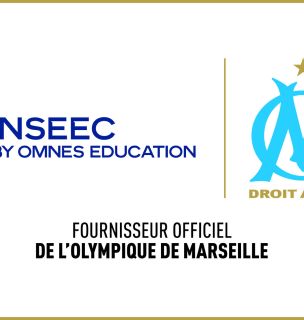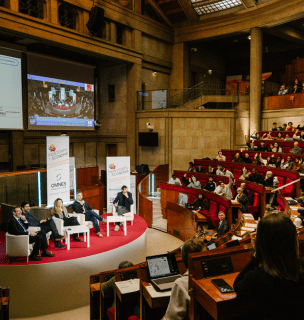La formation MSc International Business Management (100% Anglais) : qu’est-ce que c’est ?
Dans un contexte économique de plus en plus tourné vers la mondialisation, les échanges internationaux ne se limitent plus aux simples échanges économiques.
Au-delà des problèmes purement commerciaux, nous sommes de plus en plus confrontés aux notions de culture, d’environnement, de géopolitique et de stratégie.
Découvrez notre MSc International Business Management

Un diplôme en 1 ou 2 ans pour devenir un expert du management d’équipe et de projets à dimension internationaux
- Volume horaire 1ère année de MSc : 441 heures
- Volume horaire 2ème année de MSc : 441 heures
Ce programme complet s’adresse aux étudiants ayant un projet professionnel, orienté business et international. Entièrement enseigné en anglais, le MSc International Business Management forme les étudiants au développement commercial mais aussi à d’autres postes transverses leur permettant de gérer l’activité et le développement d’une unité internationale.
Le caractère transversal du contenu permettra également aux étudiants d’avoir une approche multiculturelle des marchés, permettant la mise en œuvre de stratégies marketing et commerciales adaptées aux différents continents.
Objectif de la formation
L’objectif de ce programme est de former les futurs managers internationaux et de leur fournir des capacités élevées leur permettant de faire face aux défis et aux risques pour réussir dans l’univers dynamique et complexe du commerce international. En un mot, cette formation cherche à les aider à construire leur réussite professionnelle.
Comment candidater au MSc International Business Management à l’école de commerce INSEEC?
Les pré-requis demandés
Les conditions pour accéder au dispositif de certification (hors VAE) sont :
- Pour une entrée en 4ème année (MSc1) : un titre RNCP de niveau 6 ou 180 crédit ECTS validés dans un cursus équivalent au domaine concerné.
- Pour une entrée en 5ème année (MSc2) : un titre RNCP de niveau 6 ou 240 crédits ECTS acquis dans un cursus équivalent au domaine concerné.
Un dossier écrit doit être préparé par le candidat qui devra passer également un oral de motivation. La lettre de recommandation n’est pas obligatoire mais est un plus au dossier.
Vous souhaitez en savoir plus sur le programme MSc International Business Management ? Inscrivez-vous à une Réunion d’information !
Vous souhaitez en savoir plus sur nos process de candidature ?
Quels sont les cours du MSc International Business Management ?
Les cours présentés ci-dessous sont donnés à titre d’exemple, ils peuvent varier légèrement selon le campus d’enseignement. Le contenu des cours est adapté chaque année aux évolutions du marché et est mis à jour avant chaque rentrée.
Les cours de 1ère année
MÉTHODES ET PRATIQUES PROFESSIONNELLES – 1ÈRE ANNÉE
Business Game
Le jeu d’entreprise s’effectue à l’aide d’un simulateur de gestion. Des groupes d’étudiants ont la responsabilité de gérer une entreprise en temps réel. Toutes les grandes fonctions de l’entreprise sont abordées. Les étudiants prendront des décisions dans le but de maximiser la rentabilité de l’entreprise.
Ateliers techniques professionnels et Management Personnel
- Rédaction de CV, techniques d’entretien de recrutement pour la recherche de stage, management de projet professionnel, management d’équipe et conduite de réunion.
- Techniques de négociation, analyse transactionnelle et PNL, prise de parole et gestion du trac, techniques de management et leadership (PRADITUS).
- Bilan de compétences, coaching, digitalisation du CV et techniques de recherche d’emploi au niveau national et international, préparation à la soutenance du mémoire de recherche appliqué.
Conférences Métiers
Présentation des métiers du secteur par des professionnels.
COURS TRANSVERSAUX ET FONDAMENTAUX
Business English
Parfaire les techniques de compréhension et de communication en langue anglaise dans un contexte professionnel et appliqué au secteur. Les apprenants ont l’obligation de passer le TOEIC.
Company Strategy & Business Plan
Ce module permet dans un premier temps d’intégrer la démarche de la stratégie d’entreprise : de l’analyse des besoins des clients, la structure des marchés à la dynamique des concurrents pour identifier les opportunités et les menaces de l’environnement. Il a également pour objectif d’apprendre la réalisation d’un Business Plan ou plan d’affaires : de la conception d’un projet chiffré de création ou de développement d’entreprise.
Softwares & Decision Making Techniques
Ce module a pour objectif l’approfondissement des compétences des apprenants en informatique pour répondre à la demande des entreprises en matière de suivi budgétaire ou commercial, de management de projet, de gestion du personnel et de communication avec notamment Excel, Word, Powerpoint et les outils de travail en équipe. Il vise à être performant sur les outils bureautiques, identifier et corriger rapidement les erreurs, personnaliser les outils existants ou créer ses propres outils.
Controlling, Budget & KPIs
L’objectif est d’acquérir les compétences clés en termes de gestion budgétaire et de reporting. L’accent sera notamment mis sur l’architecture budgétaire, avec la mise en œuvre des documents de synthèse, le contrôle de gestion des projets et
son lien avec la gestion budgétaire, la réalisation et le pilotage des tableaux de bord.
International Negotiation
Ce séminaire est centré sur une négociation dans un contexte international. Il faudra notamment prendre en compte la dimension culturelle et définir son impact dans une négociation internationale. La négociation est centrée sur le processus de vente au moyen d’un jeu de rôle.
Professional Tools Methods
Le jeu d’entreprise s’effectue à l’aide d’un simulateur de gestion. Des groupes d’apprenants ont la responsabilité de gérer une entreprise en temps réel. Toutes les grandes fonctions de l’entreprise sont abordées. Les apprenants prennent des décisions dans le but de maximiser la rentabilité de l’entreprise.
COURS SPÉCIALISÉS
International Legal Environment Law
This course aims to introduce legal issues which arise in negotiating, concluding and executing contracts in an international context. Such knowledge will help future global executives anticipate complex transactions abroad. Such transactions may involve contracting parties from several countries and the execution of contractual obligations in several nations.
Geopolitics & Business Approach
This seminar explores the role of international business and politics and their impact on global current events. From China to the Middle East, and from the United States to Europe, this course embraces such key factors as oil, terrorism, religion, demographics and ecology.
International Purchasing & Supply Chain Management Logistics
This course teaches the fundamentals of the procurement processes used by international corporations. Classes will combine theory and practical applications to illustrate the following key processes and actions: Purchasing Objectives, Procurement Process, Invitation to Tender, Vendor Selection and Management, Contract Negotiation, Supply Chain Management, Service Level Agreements, Quality Assurance, Legal and Contractual Obligations.
Cross-Cultural Management
In today’s cosmopolitan workplace, corporations have noticed an inability of most managers to successfully work with cultural diversity. The need for cultural awareness is driven by both the increasing internationalization of business brought about by post World War II globalization and the increased desire for diversity in the workplace.
International Accounting
Understanding the accounts of foreign companies. Establish a diagnosis on an activity, a financial situation or the cash flow of a company abroad.
International Marketing
Based on a case-study approach, this course will review classic and web-based marketing strategies, focusing on the international challenges facing today’s global corporations. Students will study – among other approaches – some or all
of the following strategic models: Blue Ocean Strategy; Megatrends and the Emergence of Metamarkets; Market Specialty as Differentiation; Customer-Led Business.
International Trade
An introduction to the terminology, basics and initial concepts of international trade. This course provides the students with tools enabling them to think strategically in a global environment.
Project Management
Understand “Project” organizations. Acquire the basic notions of the functioning of the company in “Project” mode. Acquire the technical bases and the main tools used in business.
International Communication Strategies
Enable an overview of existing and new communication tools, such as web marketing and social media, and their application to business development. How to deal with new techniques in this rapidly changing field.
Financial Management
Choice of investments and financing. Discounting and capitalization. Leverage and cost of capital. Value creation policy. Free cash flow management. Management control. Financial analysis.
International Business Development
Enable a comprehensive understanding of business development in an international context, taking into account trade regulations and cultural differences.
Foreign Language
Une seconde langue étrangère est obligatoire dans le cadre d’un programme international. Le français en tant que langue étrangère pour les étudiants internationaux est possible.
Les cours de 2ème année
STRATÉGIE DE DÉVELOPPEMENT À L’INTERNATIONAL
International Business Management
The specificities of managing a business at an international level will be described in this module. Different business regulations, different labor market laws, different business habits and cultural differences may complicate running businesses and the techniques to overcome them and make them an asset will be provided.
Consumer Behavior
This course studies the dynamics of human behavior and its relationship to decision making. It focuses on the most important factors that influence the consumer’s decision process. These include, at the individual level, motivation, personality traits and self-image, values and lifestyles, as well as psychological processes at the social and cultural level. These include group membership, social classes and cultures.
Digital Marketing
The strategies and techniques of Internet sales will be analyzed as well as the integration of an e-business strategy in the company, the multi-channel and cross-channel strategy to allow loyalty and communicate on the Internet.
International Marketing & Market Research
The first objective of this course is to understand the principles which govern marketing activities in a global environment. The course covers international market entry, product launches, marketing strategies and promotion. Students are expected to make presentations, analyze cases and develop international marketing business plan. The second objective is to master basic theory, tools and actual examples of techniques used in market research. How research can be used to help make informed strategic as well as marketing decisions to help create opportunities/solve real business problems. How to introduce products into different geographic areas.
International Business Law
This course introduces students to the special legal problems which arise in negotiating, concluding and executing contracts in an international context. International transactions may involve contracting parties from several nations and/or the execution of contractual obligations in several different nations. Special emphasis is given to the question of choice-of-law. The question of the legal implications of e-commerce is also discussed.
PILOTAGE DU DEVELOPPEMENT INTERNATIONAL
International Negotiation
Introduces students to the different negotiation techniques with an eye to the cultural context (Europe, USA, North Africa, Asia and Latin America). Participants learn how to use a win/win approach and appreciate the importance of gaining
a sound knowledge of the profile of buyers. The course also stresses the importance of learning and analyzing the key points needed to succeed in negotiation.
International Relations & Geopolitics
This course deals with the interplay of Governmental and Corporate interests in our contemporary world. It addresses the different types of power used to obtain global objectives and the hierarchies of power and influence on the planet
today. It also implies the understanding of pressures and processes that drive a company to become an international business.
International Business Law
This course introduces students to the special legal problems which arise in negotiating, concluding and executing contracts in an international context. International transactions may involve contracting parties from several nations and/or the execution of contractual obligations in several different nations. Special emphasis is given to the question of choice-of-law. The question of the legal implications of e-commerce is also discussed.
International Relations & Geopolitics
This course deals with the interplay of Governmental and Corporate interests in our contemporary world. It addresses the different types of power used to obtain global objectives and the hierarchies of power and influence on the planet today. It also implies the understanding of pressures and processes that drive a company to become an international business.
Supply Chain Management
How purchasing functions in accompany, and the major strategies of purchasing. Determine and prioritize the criteria of choice for a supplier. Import and export in the best conditions. Sourcing and e-sourcing. Management of production. International logistics and development. Drive the supply chain.
Softwares & Decision Making Techniques
Ce module a pour objectif l’approfondissement des compétences des apprenants en informatique pour répondre à la demande des entreprises en matière de suivi budgétaire ou commercial, de management de projet, de gestion du personnel et de communication : Excel, Word, Powerpoint, outils de travail en équipe, logiciels métiers. Il vise à être performant sur les outils bureautiques, identifier et corriger rapidement les erreurs, personnaliser les outils existants ou créer ses propres outils.
Méthodologie du Mémoire
Le mémoire de recherche représente l’aboutissement de la dernière année de formation. Réalisé individuellement accompagné par un(e) directeur/trice de mémoire, il permet à l’apprenant de démontrer sa capacité à formuler une problématique, faire une synthèse sous forme d’état de l’art ou de revue de la littérature sur les concepts clés, à mener une étude qualitative et/ou quantitative, et enfin à émettre des recommandations, énoncer des limites et voies de recherche.
GESTION DES PARTENARIATS INTERNATIONAUX
International Payment Methods and Incoterms
Incoterms is an abbreviation of « International Commercial Terms » published by the International Chamber of Commerce. Participants are introduced to this set of rules established for the interpretation of the most commonly used trade terms in foreign trade which parties to a contract can agree upon to avoid misunderstandings, disputes and litigation.
International Financial Techniques & Financial Risk Management
Understand the financial needs associated with basic operations in contemporary international commerce. Acquire the indispensable techniques for international financial management. Learn to choose and use the best tools with a solid approach. Know the financial risks associated with international commerce. Organizations capable of intervention and the main techniques they propose. The importance of short-term finance and cash flow management.
Finance of Major Export Contracts
Techniques for financing export operations of significant size and spread over several years are presented in this module: Which tools? How to define an export business plan? What protections against exchange rate fluctuations?
Export Strategies & Business Development
Understand the basic concepts of international sales strategies (licensing, exports etc.). Provide a global understanding of what business development is, outlining the various forms it can take. Sharing personal experience of global account management across industries and countries, for students to grasp the scope of the function and how it is performed in the professional field.
MANAGEMENT DES ÉQUIPES INTERNATIONALES
International Human Resources Management
In today’s cosmopolitan working world, companies have seen the inability of most managers to work within the framework of cultural diversity. The need for cultural awareness is driven by both the increasing internationalization of businesses due
to globalization and the increased desire for diversity in the workplace.
International Project Management
The objective is to prepare students to manage international projects and businesses, with a focus on emerging countries. Special attention is given to developing negotiation and team management skills in an international context.
Key Markets & Business Approach
This course deals with the economic, social and political context of business activities throughout a panel of key markets around the world. Special attention is paid to the factors that shape the business environment.
International Business Practices & Ethics
Understand the rules and principles of ethics in a given economic and commercial context, address moral issues in a context of economic activities, as well as the duties and obligations of the people who deal with them.
Professional Tools & Methods
Rédaction de CV, techniques d’entretien de recrutement pour la recherche de stage, management de projet professionnel, management d’équipe et conduite de réunion. Techniques de négociation, analyse transactionnelle et PNL, prise de parole et gestion du trac, techniques de management et leadership.
Foreign Language
Une seconde langue étrangère est proposée afin d’améliorer l’employabilité des apprenants.
FINANCE AND MANAGEMENT
Examens écrits 28H
Soutenance mémoire 7H
This course deals with the economic, social and political context of business activities throughout a panel of key markets around the world. Special attention is paid to the factors that shape the business environment.
Deux rentrées par an et des rythmes d’études qui varient
Deux rentrées par an sont organisées, en février/mars et septembre/octobre. Pour vérifier l’ouverture de chaque rentrée, contacter directement le service des admissions.
Le rythme de cours peut différer selon les campus et selon si la formation est effectuée sous une convention de stage (initial) ou un contrat de professionnalisation/apprentissage (continue).
Le contrat d’alternance doit obligatoirement être signé pour une durée de 12 mois (MSc2), 24 mois (MSc1 + MSc2) ou 18 mois pour les rentrées décalées de Mars (poursuite d’études en MSc2) .

Quels sont les débouchés métiers après un MSc International Business Management ?
- Manager du développement international
- Directeur du développement international / Business developement manager
- Business developer (international)
- Ingénieur d’affaires / Ingénieur commercial / Responsable d’affaires
Pour consulter les fiches métiers détaillées par spécialisation.
Quels sont les blocs de compétences métiers développées ?
- Définir la stratégie de développement international et proposer une offre pertinente selon la cible géographique
- Piloter la stratégie de développement international
- Gérer des partenariats internationaux stratégiques
- Manager des équipes internationales
Description des modalités d’acquisition de la certification par capitalisation des blocs de compétences et/ou par correspondance
La certification s’obtient par :
- La validation de quatre blocs de compétences communs à l’ensemble des parcours (obtention d’une note supérieure ou égale à 10/20 à chaque bloc de compétences)
- La réalisation d’un mémoire de fin d’études avec l’obtention d’une note supérieure ou égale à 10/20
- La réalisation d’une période en entreprise de 132 jours minimum sur la deuxième année du parcours (MSc 2)
Certification professionnelle de « Manager du Développement International » de niveau 7 (EU), codes NSF 310p, 312p et 312m, délivrée par l’INSEEC MSc (CEE-SO, CEE-RA, CEFAS, MBA INSTITUTE), enregistrée sous le numéro 36492 au RNCP (Répertoire National des Certifications Professionnelles) sur décision du Directeur général de France Compétences du 1er juin 2022
La certification est délivrée par capitalisation de la totalité des blocs de compétences. Chaque compétence d’un bloc doit être confirmée pour obtenir le bloc de compétences. La validation partielle d’un bloc n’est pas possible. Elle est également accessible par la voie de la Validation des Acquis de l’Expérience.
Retrouvez les blocs de compétences associés à ce titre RNCP en cliquant ici.
Quelles sont les modalités pédagogiques ?
Méthodes d’enseignement
- Enseignements magistraux et cours interactifs
- Mises en situation à travers des études de cas collectives ou individuelles réalisées par les étudiants
- Conférences, séminaires et visites à portée pédagogique
Modalités d’évaluation
- Études de cas individuelles ou réalisées en groupe
- Présentations orales individuelles et en groupe
- Dossiers individuels et en groupe
Méthodes et outils
- Les modalités d’évaluation sont réalisées en face-à-face, sous forme de contrôle continu ou d’examens finaux réalisés sous forme de partiels.
Quels sont les frais de scolarité 2024/2025 pour intégrer la formation ?
Formation initiale :
- Entrée en MSc1 : 11 950 €
- Entrée directe en MSc2 : 13 350 €
Formation continue (alternance) :
- Formation 24 mois : 23 950 € HT
- Entrée directe en MSc2 : 13 950 € HT
Pack étudiants internationaux : Cotisation obligatoire de 490 € en plus sur les frais de scolarité indiqués ci-dessus pour les services d’accompagnement exclusifs pour les étudiants internationaux ne venant pas de l’Union Européenne.
Dans le cadre d’une formation en alternance, les frais de scolarité sont dus par l’OPCO et l’entreprise signataire du contrat.
Vous avez des questions sur l’alternance ou notre école en général ?
VAE/VAP :
- VAE : 4 200 € HT
- VAP : 850 € HT
Quelles sont les aides au financement ?
L’INSEEC propose plusieurs dispositifs d’aides au financement :
- Le rythme alterné, en stage ou contrat d’alternance
- Le droit à la formation via le CPF
- Les partenariats bancaires.
les chiffres-clés pour le titre RNCP n°36492 "Manager du développement international"
97%
Taux de réussite – Promotion 2023
96%
Taux de présentation – Promotion 2023
*détails par campus sur demande
Comment étudier en situation de handicap ?
Le groupe OMNES Education porte une attention toute particulière à l’environnement sociétal dont relève la dimension handicap. En effet, les étudiants en situation de handicap ne devraient pas, à notre sens, rencontrer de problèmes pour poursuivre leurs études et entamer une carrière professionnelle. Nous les accompagnons pour leur faciliter l’accès aux locaux, leur offrir des conseils personnalisés ainsi que des aménagements adaptés tout au long de leur parcours scolaire.
Accessibilité des locaux : tous nos campus sont accessibles aux personnes en situation de handicap.
Pour en savoir plus sur la politique handicap du groupe OMNES Education, cliquez ici.
Contacts des référents handicap par campus :
Bordeaux : Maxime DOUENS – mdouens@inseec.com
Lyon : Anissa GASMI – agasmi@inseec.com
Rennes : Laura LE CALVEZ – llecalvez@omneseducation.com
Paris : Farid HAMAD– fhamad@inseec.com
Chambéry : Clément BERTACCO – cbertacco@inseec.com
Marseille : Océane VALOTTI – ovalotti@omneseducation.com
Actualités

mars 2024
L’INSEEC s’associe à l’Olympique de Marseille pour former les talents de demain
Lire la suite




